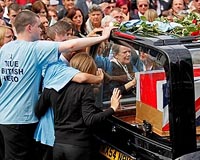| . |  |
. |
Islamabad (AFP) April 20, 2011 The highest ranking officer in the United States armed forces accused Pakistan's Inter-Services Intelligence (ISI) agency of having ties with terrorists as he arrived for security talks on Wednesday. Admiral Mike Mullen, the Chairman of the Joint Chiefs of Staff, made the remarks after touching down in Islamabad for discussions with Pakistan's top general to address concerns over official links with militants in the region. In an interview with the country's independent Geo TV network, Mullen said: "ISI has a long standing relationship with Haqqani network, that does not mean everybody in ISI but it is there." He said he was going to raise this issue with Pakistan army chief General Ashfaq Kayani and other leaders. "I believe over time that's got to change and that's the kind of focus I try to bring in my discussions with General Kayani and other leaders," Mullen said. A US embassy statement issued after the admiral's talks with Kayani and Pakistani Chairman of Joint Chiefs of Staff Committee General Khalid Shameem Wynne, said Mullen had promised Pakistan continued support in its fight against militancy. "Throughout the visit, the admiral emphasised the long-term US commitment to supporting Pakistan in its fight against violent extremists," the statement said. Pakistan's ISI has long been held to keep contact with militants operating in the wild tribal areas along the Pakistan-Afghanistan border who plague US-led forces fighting the Afghan war. Mullen's trip follows a visit to Afghanistan a day earlier in which he told reporters he would raise ongoing concerns with Kayani, according to the Joint Chiefs of Staff website. Mullen praised cooperation between US and Pakistani troops in combating the militant Haqqani network who target NATO forces in the Afghan east, but acknowledged "strain" caused by the insurgents' ties with ISI. "Haqqani is having a much more difficult time now," Mullen told reporters, according to an article on the website. "All that said, we're still working through the (Pakistani) military support, the way through the relationships the (Pakistani intelligence agency) has with the Haqqani network, and the strain that creates." The Haqqani network is an Al-Qaeda-allied organisation run by Afghan warlord Sirajuddin Haqqani and based in Pakistan's North Waziristan tribal district. The group has been blamed for some of the deadliest anti-US attacks in Afghanistan, including a suicide attack at a US base in Khost in 2009 that killed seven CIA operatives. The commander of coalition forces for the eastern region of Afghanistan, Major General John Campbell, told reporters during Mullen's visit that efforts to work with Pakistan to counter the Haqqani threat had improved. There were complementary operations either side of the border, but he acknowledged: "I don't know at what level they are tied in to the ISI." Mullen's trip is the latest shuttle diplomacy mission after a fatal shooting by a CIA contractor in January inflamed a row between the US and Pakistan over intelligence sharing and raised tensions over the controversial US drone war. Pakistan is a key US ally in the war in Afghanistan, and receives billions of dollars in military and civilian aid from the global superpower. But covert missile strikes targeting militants in Pakistan's lawless border regions, believed to operate with the tacit consent of Islamabad, stoke rampant anti-American sentiment throughout the South Asian nation. Pakistan's Foreign Secretary Salman Bashir left for the United States on Tuesday for two-day talks with State Department officials aimed at "bringing back on track" bilateral dialogue, a senior government official told AFP. During Mullen's Tuesday visit to Forward Operating Base Salerno in Afghanistan, he also acknowledged that the Taliban had grown over the course of the nearly ten-year war and that the upcoming fighting season would be tough. "I think our losses, which were significant last year, will be significant this year as well," he said. In 2010, 499 US troops lost their lives, according to the independent iCasualties.org website, in the highest annual toll since the war began in late 2001. Combat troops are set to draw down in 2014, handing control of nationwide security to Afghan army and police.
Share This Article With Planet Earth
Related Links News From Across The Stans
 Second female British soldier killed in Afghanistan
Second female British soldier killed in AfghanistanLondon (AFP) April 20, 2011 A second female British soldier has been killed in the Afghanistan campaign, the Ministry of Defence announced Wednesday, after she was hit by an explosive device she was trying to disable. Captain Lisa Head, 29, was working in an alley frequently used by Afghan and international troops in the restive southern Helmand Province. She deployed with her team to the Nahr-e Saraj district to d ... read more |
|
| The content herein, unless otherwise known to be public domain, are Copyright 1995-2010 - SpaceDaily. AFP and UPI Wire Stories are copyright Agence France-Presse and United Press International. ESA Portal Reports are copyright European Space Agency. All NASA sourced material is public domain. Additional copyrights may apply in whole or part to other bona fide parties. Advertising does not imply endorsement,agreement or approval of any opinions, statements or information provided by SpaceDaily on any Web page published or hosted by SpaceDaily. Privacy Statement |